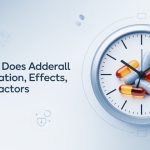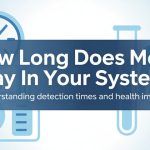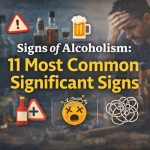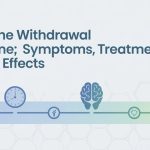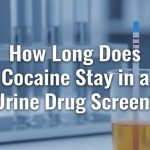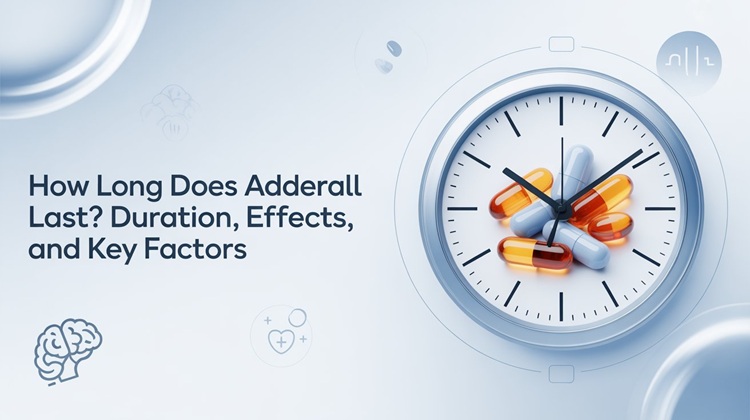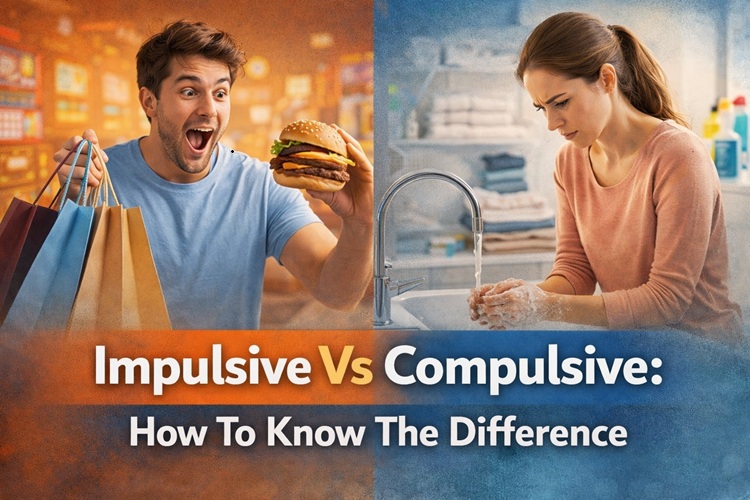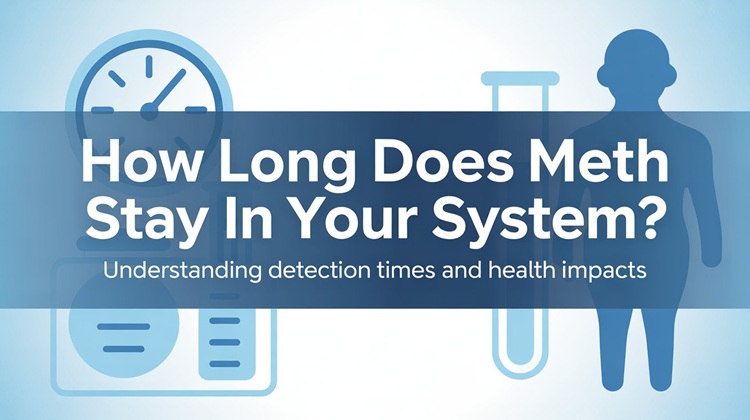Millions of people worldwide fall victim to Alcohol Use Disorder which is identified as a major medical problem. When an individual finds it impossible to maintain alcohol control, although they experience detrimental outcomes, it indicates the presence of AUD. AUD exists as an untreated medical condition that generates multiple serious health consequences and relationship problems while deteriorating overall life quality. The proper intervention of this disorder depends on knowledge regarding its symptoms along with its origins and open treatment options. The guide offers complete instructions about recognizing symptoms of Alcohol Use Disorder so people can find proper support.
What is Alcohol Use Disorder (AUD)?
Alcohol Use Disorder functions as a persistent brain illness that makes users repeatedly seek alcohol despite loss of control, along with causing withdrawal symptoms once alcohol consumption stops. The diagnostic process for Alcohol Use Disorder follows DSM-5 guidelines that establish particular assessment criteria that determine its severity from mild to severe.
Symptoms of Alcohol Use Disorder
Recognizing the symptoms of AUD is the first step toward getting help. The symptoms can be categorized into three main areas: physical, behavioral, and psychological.
Physical Symptoms
- A person with an alcohol use disorder requires larger quantities of alcohol to obtain similar sensations.
- The absence of alcohol intake results in withdrawal symptoms that include nausea and shaking and worsen with sweating.
- Frequent hangovers and blackouts
- Unexplained weight loss or malnutrition
Behavioral Symptoms
- The consumption of larger than intended amounts exceeds individual expectations
- People have repeatedly tried without success to decrease their alcohol consumption.
- Failure to fulfill commitments at work and school as well as at home forms part of substance abuse behavioral indicators.
- Under drug or alcohol influence people take unnecessary risks by driving while intoxicated along with engaging in unsafe sexual activity
Psychological Symptoms
- Strong cravings for alcohol
- People consume alcohol to decrease feelings of stress, anxiety, and depression
- Increased irritability, mood swings, or aggression
- Drinking habits instill feelings of both shame and guilt in a person

100% Confidential Support is Available 24/7
No matter what you’re going through, you’re not alone. Our dedicated team is here to provide a safe, judgment-free space where you can talk openly and honestly. Whether you need emotional support, resources, or just someone to listen.
We’re here for you—completely confidential and always respectful of your privacy. Call us today!
Causes of Alcohol Use Disorder
The development of AUD occurs through multiple different influencing elements. Researchers have divided the factors for AUD into three groups of genetic factors, environmental factors, and psychological factors.
Genetic Factors
- People with family members who are alcoholics face higher chances of developing this condition.
- When it comes to alcohol processing in the body, genetic variability plays an important role.
Environmental Factors
- Living in a residence where alcohol abuse occurs frequently throughout the household.
- The influence of group opinions along with the commonly acceptable practice of alcohol consumption.
- Easy availability of alcohol.
Psychological Factors
- People who experience depression together with anxiety disorders and post-traumatic stress disorder.
- People use alcohol as both a way to manage their stress and particular coping habits.
- Low self-esteem and past trauma.
Contact Palm Coast Treatment Solutions
Battling with Drug and Alcohol Addition? Remember, you are not alone and we are here to help you!
Stages of Alcohol Use Disorder
Alcohol use disorder unfolds step by step through various phases until it becomes severe.
1. Early Stage
- Occasional binge drinking.
- Drinking for social reasons.
- No significant negative consequences yet.
2. Middle Stage
- Increased tolerance and dependence.
- Drinking alone or in secret.
- The symptoms of withdrawal occur when a person attempts to stop their alcohol consumption.
3. Late Stage
- Complete loss of control over drinking.
- Severe physical and mental health issues
- Risk of alcohol poisoning and fatal consequences.
Overcome Addiction with Palm Coast Treatment Solutions.
Book an appointment.
Health Risks Associated with AUD
Numerous health problems emerge when someone Chronically abuses alcohol because it produces these conditions:
- Liver damage: Fatty liver, hepatitis, cirrhosis.
- Heart disease: High blood pressure, arrhythmias, cardiomyopathy.
- Brain damage: Memory loss, cognitive decline, Wernicke-Korsakoff syndrome.
- Mental health issues: Depression, anxiety, suicidal thoughts.
- Weakened immune system: Increased risk of infections.
- Digestive problems: Gastritis, ulcers, pancreatitis.
Diagnosis of Alcohol Use Disorder
Healthcare providers diagnose Alcohol Use Disorder using DSM-5 diagnostic criteria, which contain:
- The number of symptoms determines the diagnosis severity, with mild being 2-3 symptoms, moderate being 4-5 symptoms, and severe with 6 or more symptoms.
- The diagnosis of alcohol-related damage depends on physical exams and laboratory testing results.
- Testing mental health functions helps identify behavioral response patterns.
Overcome Addiction with Palm Coast Treatment Solutions.
Book an appointment.
Treatment Options for Alcohol Use Disorder
The treatment approach for AUD combines medical interventions along with behavioral therapies as well as support systems. Medical intervention selection relies on condition acuteness alongside patient-specific characteristics.
1. Detoxification and Withdrawal Management
- Medical supervision during withdrawal offers supervision of withdrawal symptoms through a safe process.
- Patients receive benzodiazepines as medication to counteract cravings and withdrawal side effects.
2. Behavioral Therapy and Counseling
- Cognitive Behavioral Therapy (CBT) assists people in changing their negative thought patterns through identifying worthless thinking.
- Through Motivational interviewing, practitioners can help patients increase their motivation to change their drinking habits.
- Dialectical Behavior Therapy assists people in mastering emotion control together with enhancing their coping abilities
3. Medication-Assisted Treatment (MAT)
- The medication Disulfiram (Antabuse) produces unfavorable side effects when patients consume alcohol.
- Naltrexone: Reduces cravings and pleasure from alcohol.
- An essential part of brain chemistry recovery occurs through Acamprosate medication.
4. Support Groups and Rehabilitation Programs
- Alcoholics Anonymous (AA): 12-step support program
- The structured rehabilitation programs at inpatient and outpatient facilities include medical supervision for clients.
- Sober living homes supply a supportive setting that facilitates recovery for those in the program.
Preventing Alcohol Use Disorder
Preventive measures exist to lower the risk for AUD despite some uncontrollable reasons that contribute to this condition.
- Setting personal drinking limits
- Avoiding binge drinking
- People can prevent stress by spending their free time actively exercising and practicing meditation instead of turning to alcohol.
- People should seek professional help during the early stages of their mental wellness problems
- Building strong support systems

Overcome Addiction with Palm Coast Treatment Solutions.
Book an appointment.
Seeking Help in Palm Coast
Alcohol Use Disorder manifests as a major health concern since professionals have developed multiple treatment approaches for this condition. Getting appropriate medical intervention with symptom recognition and factor analysis serves as essential steps for developing an alcohol-free lifestyle. People who need help with their recovery need assistance from experts at this stage. Help is accessible to people who are facing challenges or anybody who notices someone going through difficulties. Reach out to Palm Coast Treatment Solutions immediately to start your recovery journey.






